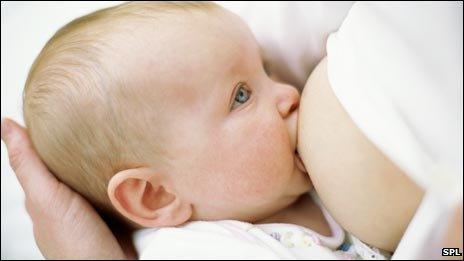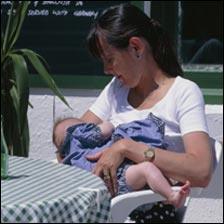Why do so many mums stop breastfeeding?
- Published

Most women start breastfeeding
Well over half of new mums have stopped breastfeeding by the time their babies are six weeks old, despite all the advice that 'breast is best' for their baby. So why do so few continue breastfeeding?
Figures out in June this year seemed to show that more women were taking the breastfeeding message on board.
The NHS Information Centre data showed that more than eight out of 10 mothers in the UK started breastfeeding their babies, up from six out of 10 in 1990.
But this week, data was published showing how many mothers in England were still breastfeeding when their babies were six to eight weeks old.
It showed that the figure was just 45%, the same rate as last year.
In fact, the rate has been stuck at around this level. The highest rate seen was 50% - in 1995 and 2009.
Complications
Experts disagree about why more women don't continue breastfeeding.

Not all mothers are made to feel comfortable breastfeeding in public
A lot of emphasis has been placed on getting women to start breastfeeding their newborns.
New mums have to demonstrate they can do so before they can be discharged from hospital.
But why do so many stop over the next few weeks?
Cracked nipples, infections such as mastitis, problems getting a baby to latch on properly or the demands of establishing breastfeeding while looking after older children can all hinder breastfeeding.
'Unpleasant'
But Rosie Dodds, a senior policy adviser for the NCT (formerly the National Childbirth Trust) says: "Women tell us they aren't getting the right information. Ninety per cent of women who stop don't want to.
"They didn't get the help and support they needed."
"All the emphasis on the benefits of breastfeeding means they feel guilty. But they should feel angry instead because they didn't get that support."
The Royal College of Midwives' Janet Fyle said: "Society's attitudes haven't changed. But women need support from their immediate family, their partner.
"And there needs to be more support across the whole of society for breastfeeding, so it isn't seen as abnormal if a woman starts feeding her baby in a cafe.
"But still a lot of women feel they can't breastfeed when they're out and about."
She warned the government needed to take a lead and promote breastfeeding nationally, rather than leaving awareness-raising up to local authorities.
"The figures aren't good now - but we risk going backwards," she warned.
But Dr Ellie Lee of the University of Kent, who focuses on parenting culture and has carried out research into attitudes towards breast and bottle-feeding, says it isn't the case that more advice and breastfeeding promotion would help women.
"A lot of women are saying they had the advice and information they needed, but breastfeeding just wasn't working.
"There are women for whom it worked with the first baby but not the next. And there are lots of women who simply find it unpleasant."
"There needs to be a reality check", she added. "The message needs to be much more pragmatic.
"Just do the best you can and stop when you feel you want to stop."
And she warned: "I can't see how the figures are going to get much better."
- Published10 May 2011
- Published14 January 2011
- Published21 June 2011
- Published17 December 2010